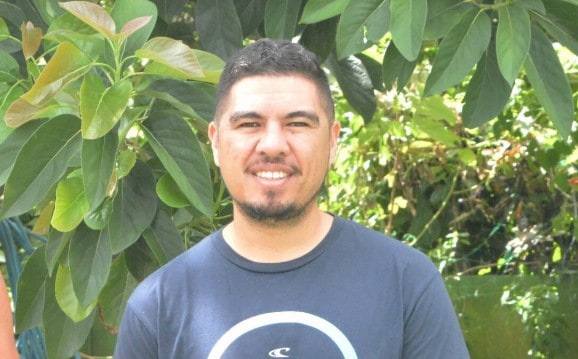Young Cook Islander helping Pacific island countries take lead role in managing their tuna resources
Saturday 24 December 2022 | Written by Matthew Littlewood | Published in Features, Local, National

Marino Wichman, , fisheries scientist at The Pacific Community (SPC), 22122346
Cook Islander Marino Wichman is leading the way in tuna fisheries science in the Pacific. He talks to Cook Islands News journalist Matthew Littlewood about the work and aspirations.
It’s a job that deals with waters stretching far and wide, and fish prized across the Pacific.
Wichman, who has been working with the Pacific Community (SPC) since 2020, began as a Pacific Islands Fisheries Professional. His current role is as a fisheries scientist (national support).
He’s based in Nouméa in New Caledonia most of the time.
“There are so many different needs in every Pacific community,” Wichman says.
“We’re providing a lot of the technical and scientific support for the Pacific Island countries, with one of our main functions, is to assist with stock assessment tools for SPC's members. We assist members with analysing their fishing trends over time, which include analysing fisheries catch and effort data, while also trying to forecast the movement of stocks in response to climate change and other environmental drivers. We’re generally the first point of call for our pacific members, particularly the science around Oceanic fisheries.”
According to its website SPC’s goal is to “progress all Pacific peoples’ rights and well-being through science and knowledge, guided by our deep understanding of Blue Pacific contexts and cultures”.
Wichman says Covid-19 has affected the way SPC liaises with its members.
“We do a lot more virtual support training, or hybrid training, which uses online teaching tools. Ordinarily, we would have done a lot more face-to-face contact, but we’ve been developing our online resources, and those can be accessed 24/7,” Wichman says.
Providing the resources for stock assessments of tuna has become increasingly important as countries focus on sustainability, he adds.
“It is really important Pacific nations are aware what goes into stock assessments – the size, length and catch frequency of fish, all those things matter.
“And once they have the data, it’s how they interpret it that’s crucial. These models can be used for providing information on the health status of the fisheries, and to ensure the conservation management measures installed are appropriate for the Pacific Island countries’ objectives for managing their fisheries.”
Wichman previously held the position of Data Manager with the Cook Islands Ministry of Marine Resources, but received a year-long attachment with SPC based in New Caledonia. He has since assumed the role of fisheries scientist with SPC.
“I got to know the work quite well and the people involved, so when the opportunity came up, I was keen to grab it,” he says.
Wichman says 27 member countries and territories are involved with SPC.
“What I’m really interested in, is transferring and upskilling the skills I had been working in the Cook Islands to a more regional level. We get a broader appreciation of how the Cook Islands operates,” he says.
“I’ve been looking at what we do in the Cook Islands in terms of managing our fisheries, and feel we really punch above our weight. For a small administration, they’ve been very active in a regional scale. They’re very vocal in voicing their concerns.”
Wichman says the more they work with stock assessments, the more they appreciate their importance.
“It’s been cool to utilise the skills and help out other countries. It’s not until you are actually working with stock assessment scientists that you appreciate the nuances that go into tuna assessments. Each country has different requirements. SPC has been a stepping stone in the amount of technical knowledge that I’ve acquired over the past couple of years.”
Wichman says SPC was generally the first port of call for many Pacific countries when it comes to technical and sometimes policy assistance around fisheries.
“In terms of outreach, we’re still exploring ways we do business, especially post-Covid. We want to engage with countries to see what we’re doing right, and what we’ve started to do is assess where the common needs are.
“It’s going to be a very busy year, but it will be exciting. We’re going to be hosting three stock assessment workshops and two statistical analysis programming workshops. That’s important, because countries need to understand the critical components of stock assessment and its management measures, but also have the capacity to undergo data analysis themselves. When they go to these regional negotiations, they need to understand the status and health of stocks.”
Wichman says the more training they offer, the more capacity and tools members can use to undergo more in-house analytical work as there is world-class talent and potential in the region.
“It’s about extending our reach, and ensuring it’s fit for purpose. Countries want to take a lead role in managing their resources, and that’s where we come in.”
Wichman says it would be good to see a lot more Pacific Islanders in these technical roles.
“It’s one of the beauties of these organisations that you have such a range of people with different backgrounds. I think SPC is heading in the right direction in having these one-year attachments with Pacific Islanders, which helps them step up and increase their knowledge space,” he says.
“It’s a two-way street. It’s about building the capacity not only at national level, but also giving back to the Pacific region as a whole.”
NEXT WEEK: Read about Ian Bertram and his work as the Coastal Fisheries and Livelihoods Advisor for Pacific Community.















































